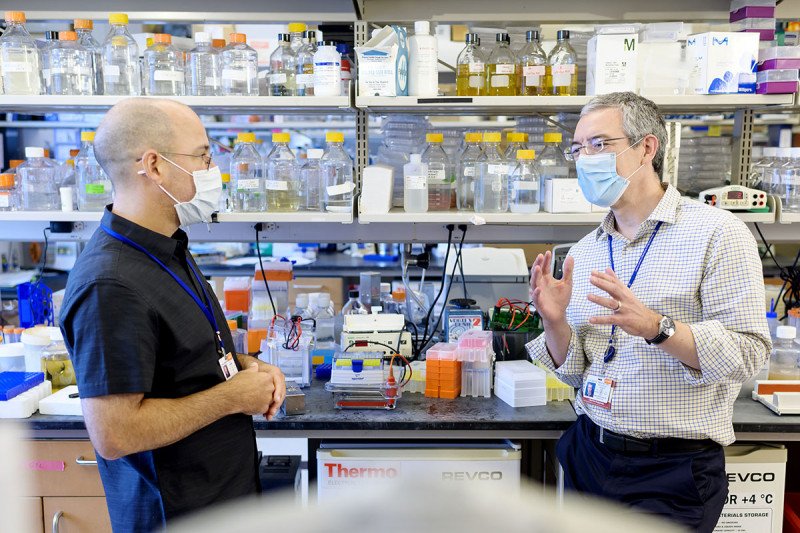
Testing for antibodies to the virus that causes COVID-19 is expanding, helping health officials get a better idea of how many people have been infected. But there is still much to learn about how the body mounts an immune response to this disease.
Antibodies are immune system proteins that bind to foreign invaders such as viruses in order to inactivate them. After an infection, the body generates a variety of antibodies to battle the intruder. One way to understand how the body fights COVID-19 is to get a clearer picture of which antibodies are called into action. This will be essential for developing an effective vaccine.
Memorial Sloan Kettering researchers have now created a powerful test that could provide much-needed clarity around immune system activity. It was produced through a collaboration between physician-scientist Michael Glickman, structural biologist Christopher Lima, and members of MSK’s Antibody & Bioresource Core Facility and Immune Monitoring Core Facility.
“This test is a valuable resource available to all MSK researchers to clarify the immune response to COVID-19,” Dr. Glickman says. “They can use the test to study this response in specific groups of cancer patients. It could also someday help determine how people with cancer might fare whenever a COVID-19 vaccine becomes available.”
Hitting Multiple Targets
Viruses are extremely small, but they can have complex shapes composed of multiple proteins. These proteins serve as antigens — molecular flags — that the immune system can recognize as foreign. When someone develops an immune response, the various antibodies generated by the immune system target different antigens in the virus.
Antibody tests typically focus on one antigen, detecting the corresponding antibody generated against it. The new MSK test focuses on three.
Dr. Glickman first used genetic engineering to produce the three COVID-19 antigens and then asked Dr. Lima to purify these proteins in large amounts. One of the antigens, called nucleocapsid protein (N-protein), is commonly used in commercial antibody tests.
The other antigens purified by Dr. Lima’s team involve what is called the spike protein — the crown-like structure that protrudes from the coronavirus surface. Spike proteins are vital to the virus because they enable it to attach to human cells in order to invade them. Dr. Lima’s lab produced both the entire spike protein and a fragment of it, called the RBD, the receptor binding domain.
Producing these proteins in large enough amounts was technically challenging, but it was made possible by the expertise of Dr. Lima’s laboratory team.
“The spike protein, and especially its RBD portion, are very important,” Dr. Glickman says. “Antibodies that target them are what we call “neutralizing antibodies.” Neutralizing antibodies bind to the virus in a way that blocks the virus from entering cells. Neutralizing antibodies usually target the RBD in particular.”
The most effective vaccines, such as those for polio and measles, stimulate the body to produce neutralizing antibodies. Because of this, “many COVID-19 vaccine efforts now being pursued are using the spike protein as the target antigen,” Dr. Glickman adds.
Being able to detect antibodies against N-proteins, spike proteins, and RBD proteins makes the MSK test especially useful, Dr. Glickman explains. Detecting the presence and amount of the different antibodies independently in people infected with COVID-19 will provide important clues about how someone fights off the virus, as well as who might be best protected if they are exposed a second time.
“We still don’t know what having antibodies means as far as actually being immune to COVID-19,” he says.
Measuring Antibody Levels
The MSK test can also do titers, which measure the levels of antibodies in the blood in addition to their presence. “You can tell whether someone’s antibody level is a hundredfold higher than someone else’s,” Dr. Glickman says. “We don’t know yet if that means anything, but it might. When people start to get vaccinated, we could use titers to measure how well they are responding. We might be able to learn if there are certain people with cancer — such as those who are immunosuppressed — who won’t respond well to a COVID-19 vaccine.”
Dr. Glickman says he and his colleagues also hope to use the test to study whether antibody levels reflect how well someone is protected from reinfection. The idea is to track antibody levels in a group of people who have recovered from COVID-19 to see how their immune systems are affected as they resume daily activities. This will be important as social distancing measures are relaxed, especially if there is not yet a vaccine.
Dr. Glickman praised the extraordinary efforts of MSK researchers across multiple labs to produce, develop, and validate the antibody test in a short time. In addition to Dr. Lima and his lab members (Eva-Maria Weick and Tomasz Kochanczyk), this includes Glickman lab member Allison Fay, Frances Weis-Garcia in the Antibody & Bioresource Core Facility, Phillip Wong and the Immune Monitoring Core staff (Erika Ritter and Yoshihiro Ohue), Agnès Viale and Kety Huberman in the Integrated Genomics Operation, and Melissa Pessin in the Department of Laboratory Medicine.
“All of these colleagues were doing this essential work all through the height of the pandemic, even when everyone else was staying home,” he says. “That really shows the high dedication of the entire research team to contribute to fighting COVID-19 for MSK staff and patients.”


